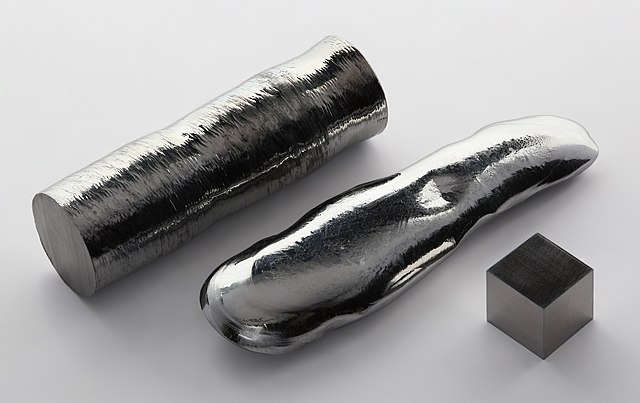Rhenium is a rare and valuable transition metal with a range of significant applications across various industries due to its unique properties. Here’s an exploration of the significance of rhenium in these sectors:
1. Aerospace and Aviation:
- Superalloys: Rhenium is a crucial component in high-temperature superalloys used in aircraft engines, gas turbines, and rocket engines. These alloys offer exceptional heat resistance, mechanical strength, and corrosion resistance, allowing for increased engine efficiency and performance.

2. Electronics:
- Filaments: Rhenium is used in the manufacture of filaments for electron tubes and X-ray tubes due to its high melting point and resistance to oxidation.
3. Catalysis:
- Hydrogenation Catalysts: Rhenium-based catalysts are used in the petrochemical industry for hydrogenation reactions, including the production of high-octane gasoline and the removal of sulfur from crude oil.
4. Nuclear Industry:
- Control Rods: Rhenium-based control rods are employed in nuclear reactors to regulate the rate of nuclear reactions.
5. Thermocouples:
- Temperature Measurement: Rhenium is used in thermocouples, which are devices that measure temperature based on the voltage generated when two dissimilar metals are joined. Rhenium thermocouples are particularly suited for high-temperature applications.
6. Semiconductors:
- Gate Contacts: Rhenium is used as a gate contact material in gallium nitride (GaN) and other semiconductor devices, improving their performance and reliability.
7. Medical Imaging:
- X-ray Tubes: Rhenium is used in the manufacture of X-ray tubes for medical imaging. Its high melting point and electrical conductivity make it suitable for this application.
8. Electrical Contacts:
- High-Performance Contacts: Rhenium-based alloys are used as electrical contacts in high-voltage and high-current electrical switches and connectors due to their excellent electrical conductivity and resistance to wear.
9. Chemical Industry:
- Catalytic Reforming: Rhenium catalysts are utilized in the production of high-octane gasoline through catalytic reforming processes.
10. Defense and Aerospace:
- Jet Engines: Rhenium-containing superalloys are used in military aircraft engines for their ability to withstand extreme temperatures and stresses.
11. Solar Cells:
- Photovoltaics: Rhenium is used in the production of thin-film solar cells and photovoltaic devices, where it acts as a back contact material.
12. Additive Manufacturing:
- 3D Printing: Rhenium alloys are used in additive manufacturing (3D printing) processes to create parts with high-temperature resistance, making them suitable for aerospace and defense applications.
13. Research and Development:
- Materials Science: Rhenium is essential for materials research, enabling the development of advanced alloys, superconductors, and other high-performance materials.
14. Emerging Technologies:
- Quantum Computing: Rhenium is used in some superconducting qubits, the fundamental building blocks of quantum computers.
Due to its scarcity and unique properties, rhenium is a critical element in industries where high-temperature resistance, corrosion resistance, and electrical conductivity are essential. Its contributions to aerospace, electronics, catalysis, and many other sectors continue to drive innovation and technological advancements.











